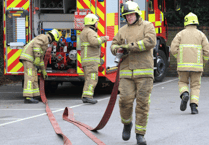The Royal College of Emergency Medicine has called for support from members of Parliament in the South West and warned the NHS is 'still in the depths of crisis'. The warning came in response to the release of the latest emergency department performance figures for January 2023.
The latest data for Accident and Emergency Department waits showed worsening performances at some South West hospital trusts, although data for the Somerset NHS Foundation Trust, which runs Musgrove Park Hospital in Taunton, showed a small improvement compared to the same time last year.
In January 2022, 59% of patients in A and E were seen within four hours. In January 2023, 61% of patients were seen within four hours, despite increasing numbers of patients and pressure on beds from delayed discharges due to lack of availability of social care.
In a statement Matthew Bryant, Chief Operating Officer at Somerset NHS Foundation Trust, said: “Colleagues at our emergency department (A&E) work exceptionally hard to see and treat our patients as quickly as possible and provide them with the support that they need.
“Like in many other areas of the country, we are seeing more patients than ever before, particularly through our emergency departments. Alongside this, we continue to experience difficulties in discharging patients from hospital to their usual home setting due to challenges in social care.
“This means our inpatient wards are often full, which has a knock-on effect on our emergency departments, leading to longer waiting times for patients. We are sorry to anyone who has experienced delays - our staff are doing their very best for you.
"All patients who arrive at our emergency departments, including via an ambulance, go through a rapid triage process to identify those with a time critical illness or injury enabling urgent, or in some cases immediate further management by a clinician. However, less urgent problems are experiencing considerably longer waits.
“We are working closely with our health and social care partners to develop and expand alternative services that give people support in the community to prevent them needing to come to hospital or support them to leave hospital when they are well enough.
“One of these services is Hospital@Home, which aims to care for patients at home safely, rather than being in hospital. We have also opened Ready to Go Units for patients who are medically-fit to leave hospital but could benefit from additional therapy and care before they return to their home setting.
“There are a wide range of health and care services available for advice and treatment. You may want to call NHS 111, visit your local pharmacist or consider using one of Somerset’s minor injuries units.”
Dr James Gagg, South West Regional Chair of The Royal College of Emergency Medicine, said: “January continued to be extremely challenging for the NHS in the South West. Emergency Medicine staff as well as our ambulance service colleagues have continued to face severe pressures. The data once again show large numbers of patients facing extremely long waits for emergency care.
"This is distressing for our patients and their families, distressing for ambulance crews who aren’t able to attend calls as quickly as they would like, and distressing for Emergency Department staff who aren’t able to deliver the optimal care they are trained to provide. Current conditions are tough. Crowding remains extreme, patients are being cared for in corridors and inadequate areas where there is little to no dignity or privacy. We are still in the depths of crisis."
The RCEM has welcomed NHS England's emergency care delivery plan. But they said while the plan contains 'many of the right initiatives' the college said "in the South West we do not have the staff to implement them."
The NHS plan aims to ensure patients are being seen faster by emergency departments. The new ambition is for 76% of patients to be admitted, transferred or discharged from A and E within four hours by March 2024. It also hopes to improve ambulance response times, with a stated ambition of "improved ambulance response times for Category 2 incidents to 30 minutes on average over 2023/24, with further improvement in 2024/25 towards pre-pandemic levels."
Overall more than half of A and E attendances resulted in a more than four hour weight this January as a national average. This represents a 10% worsening since comparable figures were released in January 2022. The figures also show one in six patients who were admitted to hospital waited 12-hours or more in an Emergency Department after the decision to admit them was made.





Comments
This article has no comments yet. Be the first to leave a comment.